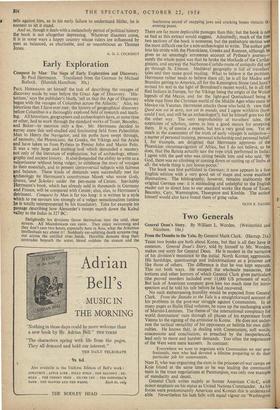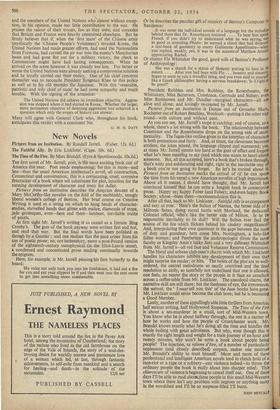Two Generals
From theDanube to the Yalu. By General Mark Clark. (Harrap. 21s.)
Time two books are both about Korea, but that is all they have in common. General Dean's Story, told by himself to Mr. Worden, makes one sorry for General Dean. He is modest in the narrative of his division's resistance to the initial North Korean aggression. His hardships, questionings and indoctrinations as a prisoner are like those of others. The difference is that he was kept separate. This cut both ways. He escaped the wholesale massacres, the tortures and other horrors of which General Clark gives particulars (the proved murders included over 11,000 US prisoners of war). But lack of American company gave him too much time for intro- spection and he told his tale before he had recovered. No such embarrassing humility would be expected from General Clark. From the Danube to the Yalu is a straightforward account of his problems in the post-war struggle against Communism. In as many pages as Stalin filled volumes, he sums up the unchanging aims of Marxist-Leninism. The theme of the international conspiracy for world domination' runs through all phases of his experience from Vienna to the signing of the armistice in Korea. He does not under- rate the tactical versatility of his opponents or belittle his own diffi- culties. He knows that, in dealing with Communists, soft words, concessions and conciliation, as preached by the inexperienced, lead only to more and harsher demands. Too often the negotiators of the West were mere learners. In contrast:
Everywhere we went to negotiate with Communists we met pro- fessionals, men who had devoted a lifetime preparing to do their particular job for communism.
Nam II, who was organising the riots in the prisoner-of-war camps on Koje Island at the same time as he was leading the communist team in the truce negotiations at Panmunjbm, was only one example of mendacity and deceit.
General Clark writes mainly as former American C-in-C, with minor emphasis on his status as United Nations Commander. As his forces were predominantly American and Korean this is understand able. Nevertheless his lash falls with equal vigour on 'Washington
and the members of the United Nations who almost without excep- tion, in his opinion, made too little contribution to the war. He praises the valour of their troops, few as they were, and concedes that Britain and France were heavily committed elsewhere. But he firmly believes that if, when the 'first team' of the Chinese army (mythically the 'Chinese People's Volunteers') invaded Korea, the United Nations had made greater efforts, had used the Nationalists from Formosa, had carried the air war into the enemy's Manchurian bases and had gone flat out for a military victory, the check to Communism might have had lasting consequences. When he arrived on the scene however it was already too late. For better or worse the United Nations were already seeking a compromise solution and he loyally carried out their policy. One of his chief concerns thereafter was to reconcile President Syngman Rhee to this policy as well as to his old enemies the Japanese. With this 'venerable, patriotic and wily chief of state' he had some sympathy and much trouble. With the signing of the armistice:
The United Nations did achieve its immediate objective. Aggres- sion was stopped where it had started in Korea. Whether the larger, more permanent objective of deterring aggression was achieved is a question which only the events of history can answer.
Many will agree with General Clark who, throughout his book, anticipates this verdict with a consistent No.
0. M. 0. DAVY



































 Previous page
Previous page